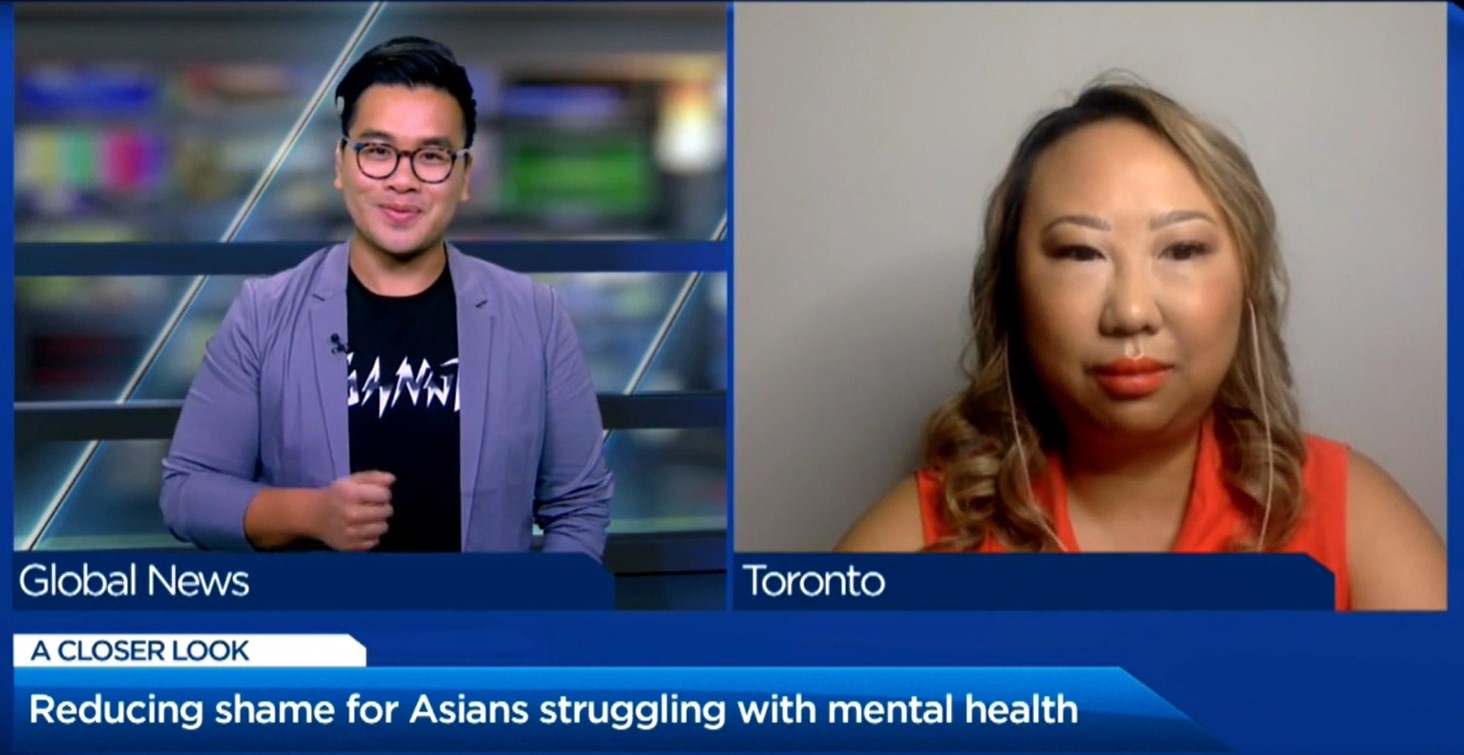Talk Therapy With Vera
Reducing Shame For Asians Struggling With Mental Health
Vera Cheng speaks with Liem Vu from Global News about reducing shame for Asians struggling with mental health and strategies to better cope during the pandemic. Get in touch to book Vera Cheng for a speaking engagement.

Liem Vu: [00:00:00] It has been an unprecedented year for the Asian community with the rise in hate crimes that whether you’ve heard it, seen it or experienced it firsthand, it can have a major impact on your mental health. Now, the barriers like stigma and shame, can often prevent people from reaching out. Vera Chang, psychotherapist and founder of Talk Therapy With Véra, joins us now to give us some insight. Hello.
Vera Cheng: [00:00:22] Hi. Thank you for having me.
Liem Vu: [00:00:24] Well, thank you so much for chatting about this, because it is such an important topic and something that we need to continue to talk about. According to CAMH (Centre for Addiction & Mental Health), stigma prevents about 40 percent of people with anxiety and depression from getting help. So can you shed some light on this stat and how stigma impacts Asian communities?
Vera Cheng: [00:00:42] This is even higher in the Asian community and definitely seeking support can be very daunting. And recognizing it is a very courageous step to seek support and not allow you being labeled to stop preventing you. And once that problem is resolved, usually then the treatment can begin with coping strategies on self care and just starting to improve your quality of life.
Liem Vu: [00:01:10] Right. Well, you know, for me, I was born and raised in Canada, but my parents came over as refugees. And even though I was born and raised here, you know, a lot of people like myself coming from an Asian culture, sometimes talking about your mental health is not something that you do. You know, it’s just the certain thing that you kind of it’s a frame of mind, you know, that people kind of adopt. And so I’m curious for folks who are dealing with issues and with mental health, how do how do they kind of approach it? I mean, it’s a matter of reaching out to speak out, but also about reframing your mind and your thoughts as well.
Vera Cheng: [00:01:45] I agree with you. So one frame, one thing to reframe your thought would be, you know, a lot of a lot of us would be thinking like, I don’t want to be seen as weak or incompetent and sometimes recognizing you’re not alone because there are others who are going through the same experiences as you. Often that we do research online that many celebrities out there are talking about their own mental health issues and struggles and how talk therapy have helped them. This would actually combat any negative thoughts on being shame of getting support.
Liem Vu: [00:02:22] Yeah, and I think that’s the thing is at the end of the day, none of us are perfect. You know, we all go through difficulties, we all go through struggles. And you say a big component to putting your mental health at the forefront is developing self compassion. So can you tell me about that and why that’s so important?
Vera Cheng: [00:02:37] I think developing self compassion, it’s a way to give yourself permission that it’s OK to need to get the support from a medical professional. And, you know, I often share my own mental health journey with my clients that I’m just as human as them. You’re not alone in this and everyone is experiencing the same experience as you. So often when exercise that I give to my clients would be look yourself in the mirror and ask yourself, as in you’re asking your friend, like, what would you say to a friend who’s experiencing the same situation as you?
Liem Vu: [00:03:19] And when it comes to seeking help, it can be a challenge culturally, financially, oftentimes, linguistically as well. What are some resources and accessible ways that folks in the Asian community can get help?
Vera Cheng: [00:03:32] I think that opening conversation with your family and friends can be very difficult and scary, but at the same time, you might want to write a description on what you want to say and educate on your mental illnesses this way that you’re able to reflect on how you want to speak with them. And it’s it will make the conversation easier. I’ve also listed some examples of the resources that that people in the Asian community can seek support, whether it’s Hong Fook Mental Health Association or Service Canada and I know there’s a list of therapists on the Canadian side is through the Asian Mental Health Collective. And there’s also a clinic in Toronto, which is a community based clinic that is called the Asian Initiative Mental Health Clinic.
Liem Vu: [00:04:28] Amazing. Vera, thank you so much for chatting about such an important topic, a conversation we need to continue to have for more information. By the way, you can visit TalktherapywithVéra.com. Thank you so much.
Vera Cheng: [00:04:39] Thank you.